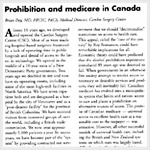
Dr. Brian Day
@DrBrianDay 
- Past President Canadian Medical Association
- Past President Arthroscopy Association of North America
- Honourary Associate Professor University of British Columbia
- 2014 Doctors of BC Don Rix Leadership Award


Almost 10 years ago, we developed and opened the Cambie Surgery Centre (CSC). Most of us were teaching hospital-based surgeons frustrated by a lack of operating time in public hospitals and denial of access to the latest in technology. We opened in the middle of a 10-year term of a New Democratic Parry government. Two years ago we doubled in size and now have six operating rooms, including some of the most high-tech facilities in North America. We have seven inpatient beds and are designated as a hospital by the city of Vancouver and as a "post-disaster facility" for the province of British Columbia. We have received visitors from interested groups all over the world, including a British trade commission. We now treat approximately 5,000 patients a year. In recent years, we have become part of the "system" by providing contracted out services to publicly funded patients on government waiting lists.
We are designed with efficiency of operation in mind and recognize that patients and doctors are our direct source of revenue. A major financial advantage is that we spend only 30% of our gross revenue on wages and salaries, compared with 70% in the public hospitals. Despite this, we pay our nurses higher-than-union rates and offer them a superior benefits package. Achieving and maintaining a successful venture in the field of private health care delivery has involved many new initiatives and we have fought many political battles with both federal and provincial governments.
Governments today seem reluctant to address necessary reform of the health care system and seem more inclined to focus on issues such as the decriminalization of marijuana or legalization of same-sex marriage. On 8 June 2004, we went to the Supreme Court of Canada, essentially to argue against government that we should "decriminalize" restrictions on access to health care. This appeal, called the "case of the century" by Roy Romanow, could have remarkable implications for all. Economic theory could have predicted that the alcohol prohibition experiment introduced 85 years ago was doomed to fail. When governments in an otherwise free society attempt to restrict access to necessary or desirable services and products, they will inevitably fail. Canadian medicare has evolved into a monopolistic system that limits and rations access to care and places a prohibition on alternative sources of access. The promise of Canadian medicare — universal access to excellent health care at a reasonable cost to the taxpayer — was attractive. However, all other successful models of universal health care, including the British and New Zealand systems on which ours was largely based, differ from the Canadian model in a fundamental way - they do not exclude competition.
Politicians have witnessed increased demands for services and soaring costs (now near 50% of total revenues in many provinces) combined with decreased delivery of services and have failed to act. They have behaved like the corporate board of a company in trouble, making a cash call on their shareholders rather than addressing structural problems in the organization. They pour in more cash, but are not brave enough to advocate meaningful reform. Canadians suffer as they languish on ever-growing waiting lists. We have a global funding system for our hospitals that is not tied to performance. Would 10% of patients be allowed to leave emergency departments without being seen if the hospital's revenue was generated by or linked to each patient? Governments make decisions based on political or "public policy" criteria rather than applying fiscally sound criteria. In a recent example in Ontario, a procedure not available in that province (a type of ankle replacement approved in Canada and pending FDA approval in the United States) was contracted out to a private institution in Columbus, Ohio, at a cost of US$35,000. At CSC, we offered to perform the same procedure for US$12,000, but were rejected on the basis that Ontario would not pay a Canadian private provider. In a recent twist, because the US facility has used its quota of implants under the FDA, the patient is now planning to have the surgery done at CSC — paying the cost personally.
I hope and believe that the Supreme Court of Canada will soon impose a solution on our governments by ruling that the present restrictions on private health care and insurance are unconstitutional. The result will be the development of a European-style system of health care. This is what we argued last June. The lack of leadership from Canadian politicians and a fear of public-sector trade unions have caused untold misery and suffering for patients.
In a Time magazine "Viewpoint" article in 1999, Ralph Klein wrote a piece entitled "Why I want to privatize surgical services." What happened? The Canadian Union of Public Employees (CUPE) poured millions of dollars into a major propaganda campaign targeting Alberta's Bill 11. The result was capitulation and, contrary to the perceptions of many Canadians, Alberta now has the most draconian restrictions on access to private health care of any province in Canada.
Despite pseudo-patriotic propaganda statements (e.g., "the best system in the world"; "a defining feature of Canadian identity") made by supporters of the status quo in Canada, our health system is ranked very poorly by such organizations as the World Health Organization and the Organisation for Economic Co-operation and Development and is certainly not one of the best. France and countries such as Belgium, Germany, Holland, Luxembourg and Switzerland have systems that offer universal health care for all their citizens.
Two major features distinguish these countries from Canada. One is that there is a private sector competing for insurance and service delivery and the second is that there are no waits for diagnostic or therapeutic interventions in their public systems. Difficult though it may seem for some Canadians to believe. "poor people" may obtain an MRI immediately. They do not wait for so-called "elective surgery" and are not kept waiting in emergency departments for many hours. In addition, access CO new technology is far better than in Canada.
As physicians, we need to be ready for the coming change. Aging baby boomers demand more than governments deliver and reject the imposition of prohibition. Privatization has been filling the void left by rationing. Its growth is limited by legal restrictions that continue to outlaw private medical insurance. Change will come much faster if the Supreme Court of Canada upholds the right of Canadians to have the same privilege of access as those exempt from the Canada Health Act (visitors, non-residents, RCMP workers' compensation, Canadian armed forces, aboriginal people, prisoners and even our pets).
Between $10 and $30 billion in additional revenue will be generated from non-tax revenue sources if the court supports our arguments.
European-style health care, with a supplemental non-government insurance and delivery system will create tremendous opportunities, not only for private health providers, but also for public institutions. The latter will be able to generate revenue that can be used to increase and improve services. As a visiting teacher in Cuba last year, I learned that the orthopedic hospital in Havana generated an annual profit of US$20 million by treating non-residents from Latin America. We should be ready to embark on similar initiatives here. It is ironic that we are unable to pursue entrepreneurial activity that a communist country has shown to be successful.
In addressing the Supreme Court of Canada last year, the lawyer for the Canadian Senate (uniquely intervening and arguing against the Attorney General of Canada and the governments of Ontario and Quebec) stated the issue in simple terms.
"Governments cannot have it both ways," he said. "They cannot promise access to health care, fail to deliver on the promise, and at the same time outlaw alternatives."
Let us all hope that the court listened to him.
This article appeared in Volume 7, Issue 1, of the Canadian Society of Physician Executives journal. It was written by Dr. Brian Day, MD, FRCSC, FRCS, Medical Director, Cambie Surgery Centre